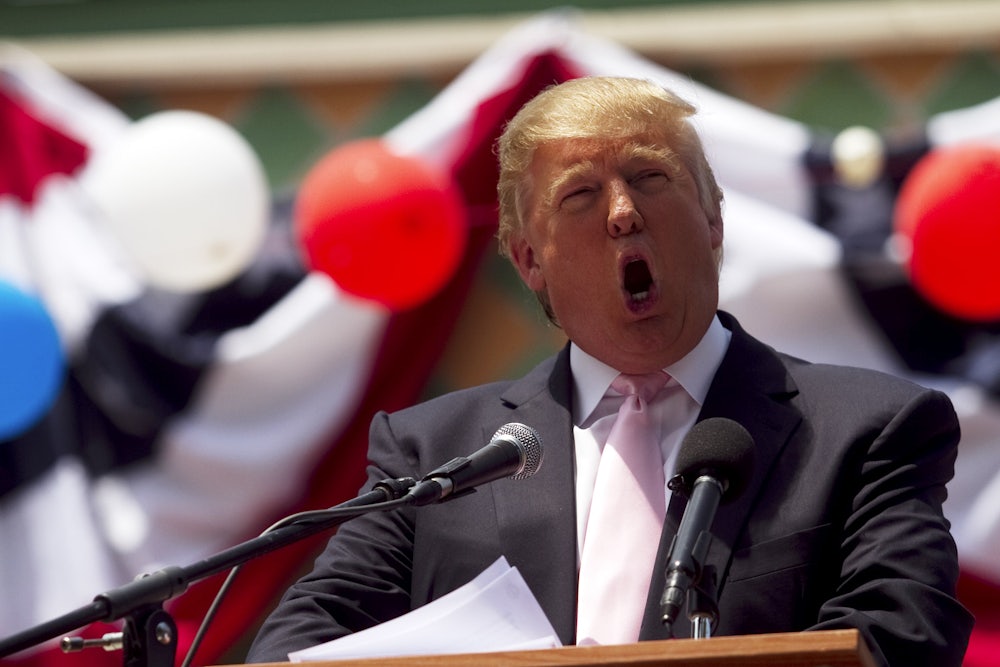After pitching himself to voters as a hard-nosed negotiator who could easily wring out of the political system accomplishments that had eluded all past presidents, Donald Trump turns out to be uniquely bad at quarterbacking legislation through Congress.
Perhaps because Trump lacks both the ideological commitment and attention span that steady-handed leadership requires, the Republicans who run Congress have eyed a large, temporary, regressive tax cut as consolation—the same contingency they adopted in the early months of the George W. Bush administration. The party might stumble over health care and government funding, but if there’s anything Republicans should know how to do blindfolded it’s cut tax rates on a partisan basis.
Trump is now doing everything in his power to prove that assumption wrong.
“President Donald Trump has ordered White House aides to draft a tax plan that slashes the corporate tax rate to 15%,” the Wall Street Journal reported on Monday, “even if that means a loss of revenue and exacerbating the procedural and partisan hurdles he faces in search of his first major legislative victory, according to people familiar with the directive.”
At a glance, Republicans must have been thrilled to learn that Trump is now backing a massive, deficit-increasing corporate tax rate cut. But in his haste to rush a blueprint out the door ahead of his 100th day in office this Saturday, Trump committed his administration to a plan that very likely won’t work, even if Republicans in Congress support it unanimously.
The Bush tax cuts ultimately expired because they were enacted through the congressional budget process. Bills passed through this process can’t be filibustered, but also can’t be used to enact legislation that increases deficits outside of the budget window. To get around this problem, Republicans in 2001 included a 10-year sunset provision in the tax cuts, and passed them with less than 60 votes.
Ahead of Trump’s inauguration, congressional Republicans led by House Speaker Paul Ryan drew up a moonshot plan to make their tax cuts permanent, one that dovetailed with their rallying cry for the better part of a decade. A swift repeal of the Affordable Care Act, including the law’s revenue streams, would have been a large, permanent tax cut unto itself. Once Obamacare’s taxes were gone, the thinking went, Republicans could tinker further with the code without worrying about increasing deficits, because they would have already secured their revenue cut.
Trump took just enough ownership of the GOP repeal plan–known as the American Health Care Act–that the doomed effort became known as “Trumpcare.” But the president never bothered to learn the details of the legislation, or persuade the public and members of Congress of its merits.
He also, apparently, never bothered to learn the ins and outs of the budget reconciliation process, or how it might interact with certain changes to the tax codes.
It’s natural that Republicans returned to their fallback plan—a temporary tax cut—when the AHCA failed even to reach a vote in the House. But in his haste to avoid a public relations disaster on his 100th day in office, Trump jumped the gun.
At the Institute of International Finance’s policy summit last week, Ryan’s senior tax counsel, George Callas, noted that the second-order consequences of slashing corporate tax rates are significant enough that their revenue effects can be detected past the 10-year window even if they expire after three years.
“[Budget] reconciliation says you cannot increase the deficit after 10 years,” Callas explained. “Here’s a datapoint for folks: A corporate rate cut that is sunset after three years will increase the deficit in the second decade. We know this. Not 10 years. Three years. You could not do a straight-up un-offset three-year corporate rate cut in reconciliation. The rules prohibit it. You might be able to do two years. A two-year corporate rate cut … would have virtually no growth effect.… It would just be dropping cash out of helicopters on corporate headquarters for a couple of years.”
Apparently nobody from Ryan’s office alerted the president to this counterintuitive policy quirk, because his latest edict is to get the corporate rate down to 15 percent, even if it isn’t offset.
Latest evidence that Trump has effectively ended conservatism as practiced by Paul Ryan https://t.co/QlTcARZNgg
— Chris Cillizza (@CillizzaCNN) April 24, 2017
Ryan is likely to be annoyed by this, but contra CNN’s Chris Cillizza, it won’t be because Ryan is averse to debt-financed tax cuts. It’s because Trump shambled into a particular tax-cutting strategy that is likely too useless to pass a Republican Congress, and that in turn will set back (and perhaps imperil) a classic, Bush-style 10-year income tax cut for the rich.
Trump’s commitments are so fleeting that he could abandon this plan in favor of another at any moment. It wouldn’t be the first time in Trump’s young presidency that his ego and incuriousness landed him in an unsustainable position. But if Trump rolls out this idea with great fanfare to signify the supposed productivity of his presidency, he will instead have conveyed all of the unflattering things about it—the incompetence, the image-obsessiveness, the ignorance, the ignorance of the ignorance—that he’s trying so hard to obscure.
